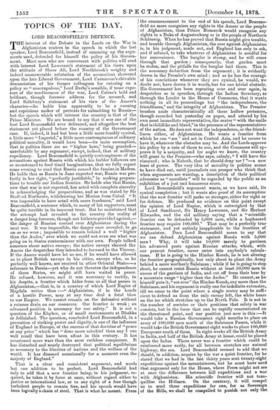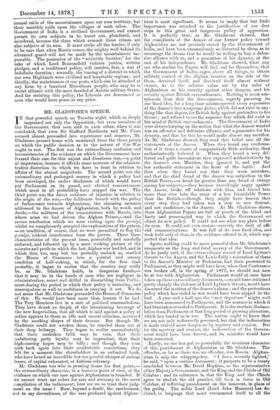TOPICS OF THE DAY.
LORD BEACONSFIELD'S DEFENCE. THE interest of the Debate in the Lords on the War in Afghanistan centres in the speech in which the last speaker, Lord Beaconsfield, instead of summing up the argu- ments used, defended for himself the policy of his Govern- ment. Most men who are conversant with politics will read with interest Lord Lawrence's statement of his views upon the attitude of Shere Ali, Lord Northbrook's weighty and indeed unanswerable refutation of the accusations showered upon the late Liberal Government, Lord Carnarvon's chivalric denunciation of his former colleagues for entering on a policy so "unscrupulous," Lord Derby's sensible, if tame expo- sure of the needlessness of the war, Lord Cairns's bold and brilliant, though forensic address for the accused, and Lord Salisbury's statement of his view of the Ameer's character—he holds him apparently to be a cunning and capricious maker of pretexts for submitting to Russia— but the speech which will interest the country is that of the Prime Minister. We are bound to say that it was one of the best Lord Beaconsfield ever delivered, and altogether the best statement yet placed before the country of the Government case. If, indeed, it had but been a little more frankly cynical, a little more "Imperial," a little more contemptuous of ordinary political morality, it would have been—its main assumption, that in politics there are no "higher laws," being granted- unrefutable by any argument, except, indeed, that of military expediency. Lord Beaconsfield is quietly contemptuous of the accusations against Russia with which his feebler followers are so accustomed to feed timid imaginations, that we fully expect some evening to read that Russia caused the famine in Madras. He holds that as Russia in June expected war, Russia was per- fectly in her right, "perfectly justifiable," in making prepara- tions to trouble our Indian frontier. He holds also that Russia, now that war is not expected, has acted with complete sincerity in acknowledging the preparations, and as was stated by Sir Stafford Northcote, withdrawing her Mission from Cabal. "It was impossible to have acted with more frankness," said Lord Beaconsfield, a sentence which, to many of his supporters, must be quite terrible in its innocent trust. But he maintained that the attempt had revealed to the country the reality of a danger long foreseen, though not hitherto provided against,— the danger of Russian control over Afghanistan during the next war. It was impossible, the danger once revealed, to go on as we were ; impossible to remain behind a wall "higher than the Andes," over which we could not even see what was going on in States conterminous with our own. People talked nonsense about native envoys ; the native envoys showed the Ameer the despatches they intended to forward to the Viceroy. If the Ameer would have let us see, if he would have allowed us to plant British envoys in his cities, envoys who, as he perfectly well knows, are received in other Oriental States—a reference to Persia—yet who do not threaten the independence of those States, we might still have waited in peace. He refused, however, and it was necessary to rectify, in his despite, a frontier which hides from us all that passes in Afghanistan,—that is, in a country of which Lord Napier of Magdala writes thus :—" Afghanistan, if in the hands of a hostile Power, may at any time deal a fatal blow to our Empire. We cannot remain on the defensive without a ruinous drain on our resources. Our frontier is weak ; an advanced position is necessary for our safety." It is not a question of the Khyber, or of small cantonments at Dhakka or Jellalabad. The question, concluded Lord Beaconsfield, in a peroration of striking power and dignity, is one of the influence of England in Europe, of the success of that doctrine of "peace at any price" which has "done more mischief than any I can well recall that have been afloat in this century. It has occasioned more wars than the most ruthless conquerors. It has disturbed and nearly destroyed that political equilibrium so necessary to the liberties of nations and the welfare of the world. It has dimmed occasionally for a moment even the majesty of England."
That is a clear and consistent argument, and needs but one addition to be perfect. Lord Beaconsfield had only to add that a new frontier being, in his judgment, re- quired, he takes it by force at once, without regard either to justice or international law, or to any right of a free though turbulent people to remain free, and his speech would have been logically a chain of steel. That is what he meant. From the commencement to the end of his speech, Lord Beacons- field no more recognises any rights in the Ameer or the people- of Afghanistan, than Prince Bismarck would recognise any rights in a Duke of Augustenburg or in the people of Northern Schleswig. When he has proved that Russia might give trouble, and trouble through Afghanistan, the case against Afghanistan is, in his judgment, made out, and England has only to ask,. and if refused, to take whatever of Afghanistan is needful for her convenience. The burglar is strong, and he will come through that garden ; consequently, that garden must be stolen, and the pitfalls for the burglar laid there. This is the necessary deduction from the argument ; it is evidently drawn in the Premier's own mind ; and as he has the courage- of his convictions whenever they are cynical, he would, we doubt not, have drawn it in words, but for one trivial obstacle. His Government has been repeating over and over again, in despatches as in speeches, through the Indian Secretary, as- through the Leader in the House of Commons, that it wants nothing in all its proceedings but "the independence, the friendliness," and the integrity of Afghanistan. The Premier brushes aside characteristically all these hollow pretences,. though recorded but yesterday on paper, and uttered by his own most immediate representative, the orator" with the smile that is childlike and bland," in the presence of the representatives of the nation. He does not want the independence, or the friend- liness either, of Afghanistan. He wants a frontier from which he can " see " and act in Central Asia, and he means to have it, whatever the obstacles may be. And the Lords approve his policy by a vote of three to one, and the Commons will ap- prove it by a majority, and for aught we know, the country will grant to the Premier—who says, calmly," I will have the vineyard ; who is Naboth, that he should deny me ? "—a new lease of power. The very idea of morality in politics seems to have died out, until journalists can prosper who think that when arguments are wanting, a description of their political advocates as " moralists " will be regarded by the public as an exhibition of a just and humorous scorn.
Lord Beaconsfield's argument wants, as we have said, its cynical completion ; but it wants also proof of its assumption that the new frontier will make us stronger, either for sight or for defence. He produced no evidence on this point except the opinion of Lord Napier, which is outweighed by that of Lord Sandhurst, Sir Henry Lawrence, and Sir Herbert Edwardes, and the old military saying that a "scientific frontier can be defended by 5,000 men, while a haphazard frontier may require 100,000." That may be a perfectly true statement, and yet entirely inapplicable to the frontiers of Afghanistan. Does Lord Beaconsfield mean to say that we can defend Afghanistan against Russia with 5,000 men ? Why, it will take 10,000 merely to garrison his advanced posts against Russian attacks, which, with our present frontier, never enter into anybody's calcula- tions. If he is going to the Hindoo Koosh, he is not altering the frontier geographically, but only about to plant the Army behind a more northerly Suleiman ; while if he is going to stop short, he cannot resist Russia without at least 50,000 men in excess of the garrison of India, and cut off from their base by a mountain range "higher than the Andes." He cannot, as he himself puts it, "see over" the Hindoo Koosh, any more than the Suleiman, and his argument is really one for indefinite extension,. till we come to the point where a single sentry may be suffi- cient to defend us from the only enemy left, the white bears on the ice which stretches up to the North Pole. It is not in the number of sentries or their positions that safety in war consists, but in the force that can be rapidly concentrated on the threatened point, and our position just now is this :—It would take a Russian Government eight months to place an army of 100,000 men north of the Suleiman Passes, while it would take the British Government eight weeks to place 100,000. Europeans south of them. In eight weeks all the British Army in India, and half of the British Army at home, could be place& upon the Indus. There never was a frontier which could be- reinforced more easily, for all between stretches our natural highway, the sea. Lord Beaconsfield seemed to add that we. should, in addition, acquire by the war a quiet frontier, for he stated that we had in the last thirty years sent twenty-eight expeditions against the mountaineers, but he must have uses that argument only for the House, where Peers might not see at once the difference between hill expeditions and a war with Afghanistan. His scientific frontier will not tran- quillise the Hillmen. On the contrary, it will compel us to send three expeditions for one, for as Sovereign of the Hills, we shall be compelled to punish not only the
annual raids of the mountaineers upon our own territory, but their monthly raids upon the villages of each other. The Government of India is a civilised Government, and cannot permit its own subjects to be burnt out, plundered, and murdered, because the clans which commit those crimes are also subjects of its own. It must strike all the harder, if only to be sure that when Russia comes, the mighty wall behind its advanced guard will not be made by the mountaineers im- passable. The possession of the "scientific frontier," for the sake of which Lord Beaconsfield violates justice, written pledges, and a traditional policy, will involve, first, a war of indefinite duration ; secondly, the taming of a district to which our own Highlands were civilised and hospitable regions ; and thirdly, the maintenance of our posts, which can be attacked at any hour by a fanatical Mussulman people, who may be in secret alliance with the most dreaded of Asiatic military States. And for resisting this policy, the Liberals are denounced as men who would have peace at any price.







































 Previous page
Previous page